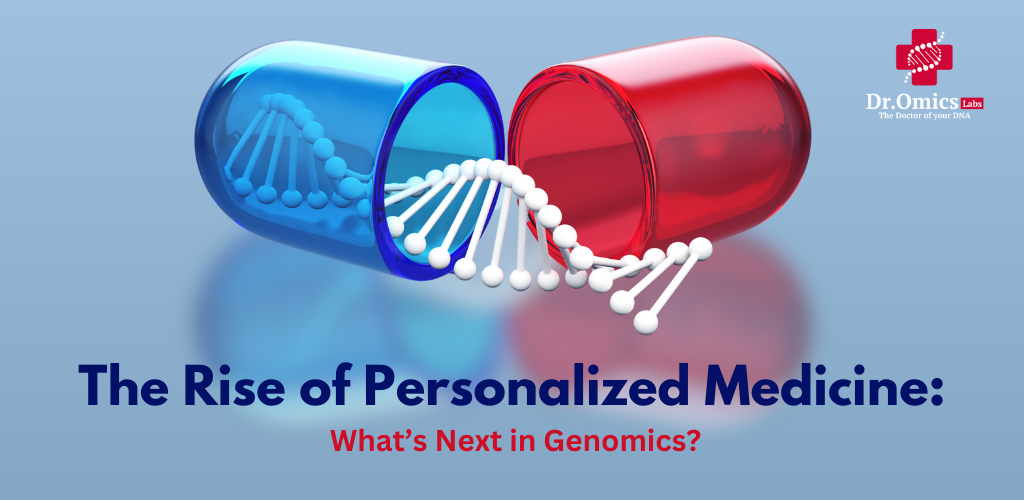The Rise of Personalized Medicine: What’s Next in Genomics?
The landscape of healthcare is undergoing a transformative shift, driven by advances in genomics. As we witness rapid technological breakthroughs, personalized medicine is emerging as a cornerstone of modern healthcare. Recent personalized medicine (individual’s medical treatment) news highlights significant innovations from genomics and pharmacogenomics to high-throughput screening, omics technologies, bioinformatics, and precision diagnostics, while experts provide precision medicine (individual’s molecular and genetic information) updates that forecast a future where treatments are tailored to each individual’s genetic profile. [1]
Personalized medicine integrates genetic, environmental, and lifestyle information to design targeted interventions. In this context, genomics plays a crucial role by enabling detailed analysis of an individual’s genome, providing insights that can inform personalized healthcare strategies. This approach has accelerated the development of more effective therapies with fewer adverse effects. Here, we explore the evolution and future potential of this dynamic field.
Key Drivers of Personalized Medicine
- Advanced Genomic Sequencing:
The cost of genomic sequencing has plummeted over the last decade, enabling widespread access to whole-genome and exome sequencing. This breakthrough has fostered genomics in personalized healthcare by providing detailed genetic blueprints that guide therapeutic decisions. - Big Data and AI Integration:
Large-scale data analytics and artificial intelligence are pivotal in interpreting complex genomic data. Machine learning algorithms are being developed to predict disease risks and drug responses based on genetic variants, paving the way for tailored treatments and more efficient clinical trials. [2] - Patient-Centric Approaches:
Empowered patients now have access to their genomic information, facilitating informed decision-making regarding lifestyle modifications and treatment options. This trend is catalyzing a shift from one-size-fits-all protocols to bespoke healthcare solutions. [3]
Technological Innovations Shaping the Future
Recent precision medicine updates underscore several technological advancements that are reshaping the field:
- CRISPR and Gene Editing:
Genome editing tools such as CRISPR-Cas systems are not only revolutionizing basic research but also hold promise for correcting genetic mutations directly in patients. This technology represents a quantum leap in the future of genetics which holds significant potential for developing therapies, including permanent cures, for inherited diseases. [4] - Multi-Omics Integration:
The convergence of multi omics data provides a holistic view of disease mechanisms by the integration of diverse data streams, such as genomics, proteomics, and metabolomics, which may enhance clinicians’ ability to predict treatment outcomes and customize therapies based on a patient’s comprehensive biological profile. [5] - Digital Health Platforms:
Mobile applications and wearable devices are collecting real-time health data, which, when combined with genomic insights, allow for continuous monitoring and adjustment of treatment regimens. These platforms are central to implementing genomics in personalized healthcare. [6]
Benefits and Challenges
Personalized medicine holds the promise of:
- Optimized Treatment Efficacy:
Tailored therapies improve outcomes and minimize adverse effects by targeting the underlying genetic causes of diseases. - Cost-Effectiveness:
By reducing the trial-and-error approach common in traditional medicine, personalized treatments have the potential to reduce healthcare costs over time by optimizing treatment strategies . - Preventive Healthcare:
Early identification of genetic predispositions enables proactive interventions, ultimately preventing disease onset.
However, challenges remain in the widespread adoption of these technologies:
- Data Privacy and Security:
Handling sensitive genomic data necessitates stringent security measures and robust regulatory frameworks to protect patient privacy. - Ethical Considerations:
The potential for misuse of genetic information raises ethical concerns regarding discrimination and consent. - Integration into Clinical Practice:
Bridging the gap between research innovations and routine clinical application requires extensive validation, training, and infrastructure upgrades.
Looking Forward: The Future of Personalized Medicine
Looking ahead, the future of genetics appears set to revolutionize healthcare even further. With continuous precision medicine updates and breakthroughs in gene editing and multi-omics, clinicians are poised to adopt more dynamic and adaptive treatment strategies. The integration of artificial intelligence with genomics promises to enhance predictive analytics, enabling proactive interventions before diseases fully manifest. As the field matures, personalized treatment regimens will not only improve clinical outcomes but may also reduce long-term healthcare costs by shifting the focus from treatment to prevention.
In summary, the rise of personalized medicine is heralding a new era in healthcare, where the amalgamation of genomics, data analytics, and innovative biotechnology leads to truly individualized care. By leveraging advances in sequencing, gene editing, and digital health, the future of genetics is unfolding in ways that promise to reshape patient care, drive cost efficiencies, and ultimately, enhance global health outcomes.
References
- Babu, B. K. (2024). Personalized Medicine and Advancements in Pharmacology: Shaping the Future of Healthcare. International Journal of Pharmaceutical Investigation, 14(2), 338–342. https://doi.org/10.5530/ijpi.14.2.41
- Big Data Predictive Analytics for Personalized Medicine: Perspectives and Challenges (T. Al-Quraishi, N. Al-Quraishi, H. AlNabulsi, H. AL-Qarishey, & A. H. Ali , Trans.). (2024). Applied Data Science and Analysis, 2024, 32-38. https://doi.org/10.58496/ADSA/2024/004
- Abid, M. H., Kumah, A., Newera, A., & Hafez, P. (2024). Patient-Centered Healthcare: From Patient Experience to Human Experience. Global journal on quality and safety in healthcare, 7(4), 144–148. https://doi.org/10.36401/JQSH-24-X2
- Wang, Y. (2024). Advances in Gene Editing Technology in Biomedicine. Medscien, 1(10). https://doi.org/10.61173/1yzv6750
- Huang, K., Lidbury, B. A., Thomas, N., Gooley, P. R., & Armstrong, C. W. (2025). Machine learning and multi-omics in precision medicine for ME/CFS. Journal of translational medicine, 23(1), 68. https://doi.org/10.1186/s12967-024-05915-z
- Bombard, Y., Ginsburg, G. S., Sturm, A. C., Zhou, A. Y., & Lemke, A. A. (2022). Digital health-enabled genomics: Opportunities and challenges. American journal of human genetics, 109(7), 1190–1198. https://doi.org/10.1016/j.ajhg.2022.05.001




